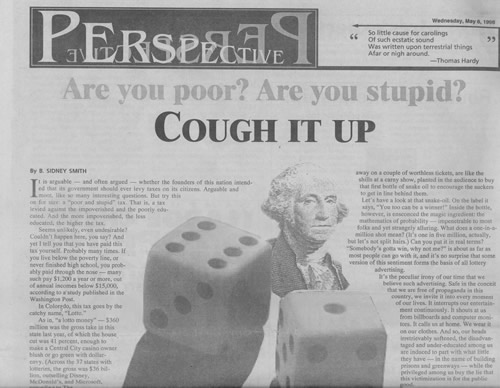 It is arguable—and often argued—whether the founders of this nation intended that its government should ever levy taxes on its citizens. Arguable and moot, like so many interesting questions. But try this on for size: a “poor and stupid” tax. That is, a tax levied against the impoverished and the poorly educated. And the more impoverished, the less educated, the higher the tax.
It is arguable—and often argued—whether the founders of this nation intended that its government should ever levy taxes on its citizens. Arguable and moot, like so many interesting questions. But try this on for size: a “poor and stupid” tax. That is, a tax levied against the impoverished and the poorly educated. And the more impoverished, the less educated, the higher the tax.
Seems unlikely, even undesirable? Couldn’t happen here, you say? And yet I tell you that you have paid this tax yourself. Probably many times. If you live below the poverty line, or never finished high school, you probably paid through the nose—many such pay $1200 a year or more, out of annual incomes below $15,000, according to a study published in the Washington Post.
In Colorado, this tax goes by the catchy name, “Lotto.”
As in, “a lotto money.” $360 million was the gross take in this state last year, of which the house cut was 41%, enough to make a Central City casino owner blush—or go green with dollar-envy. Across the 37 states with lotteries, the gross was $36 billion, outselling Disney, McDonald’s, and Microsoft, according to the Washington Post. In the mile-high state, that “house cut” included $21.6 million for retailers, about $90 million for the state itself, and a clean $32 million for the charitable folks who operate this sheep-shearing cartel on the state’s behalf.
The hucksters for this predatory carnival show—including many politicians delighted to raise taxes without raising taxes—are quick to point out that people of all incomes buy tickets. “Big jackpot games are equalizers,” proclaims Iowa’s lottery commissioner, quoted in the Post. For the sake of his soul, one can only hope it was self-deception and not conscious contempt for the underclass when he added, "Those who were not fortunate in the drawing of genes and inheritance can venture a chance equal to everyone else to benefit financially." A one-in-a-million shot at financial security, in other words, is equated with being born to the ruling class.
The seductiveness of that falsehood is apparent: nearly two-thirds of lottery tickets sold are snatched up by fewer than a tenth of all lottery ticket buyers—and these are the desperate. For every middle-class buyer of the occasional ticket there is an army of the poor spending $100 a month on average, investing money they cannot afford in a sham hope of acquiring wealth and happiness. Those upper and middle class players of the lottery, whom the Lotto folks beam about and who can actually afford to throw a few dollars away on a couple of worthless tickets, are like the shills at a carny show, planted in the audience to buy the first bottle of snake oil to encourage the suckers to get in line behind them.
Let’s have a look at that snake-oil. On the label it says, “you too can be a winner!” Inside the bottle, however, is ensconced the magic ingredient: the mathematics of probability—impenetrable to most folks and yet strangely alluring. What does a one-in-a-million shot mean? (It's one in five million, actually, but let's not split hairs.) Can you put it in real terms? “Somebody's gotta win, why not me?” is about as far as most people can go with it, and it's no surprise that some version of this sentiment forms the basis of all lottery advertising.
It’s the peculiar irony of our time, that we believe such advertising. Safe in the conceit that we are free of propaganda in this country, we invite it into every moment of our lives. It interrupts our entertainment continuously. It shouts at us from billboards and computer monitors. It calls us at home. We wear it on our clothes. And so, our heads irretrievably softened, the disadvantaged and undereducated among us are induced to part with what little they have—in the name of building prisons and greenways—while the privileged among us buy the lie that this victimization is for the public good.
Beats paying honest taxes, I guess.
Try this: get eight ordinary dice. Roll them all at once. If they come up all snake-eyes, you’ve won. I'm not going to tell you the odds, just try it. Keep at it as long as you can stand it. Until you're sick to death of it. The odds are much better than picking a winning lottery ticket, and yet you could almost certainly devote the remainder of your life to it without ever getting a winning roll.
Oh, one other thing. Each time your roll those dice, take a dollar from your wallet, preferably one you can ill afford to throw away. Burn it. Soon “one-in-a-million” will begin to mean something to you, and you will understand why the secret ingredient in this snake oil—the one with the government stamp on it, no less—is the perfect tool to exploit the vulnerability and ignorance of our most defenseless citizens.

